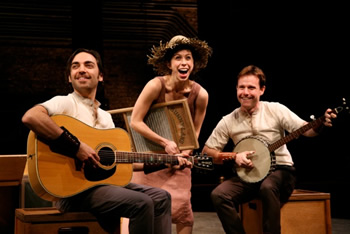To attend the 10th Anniversary Gala of the Asheville Lyric Opera was to forget for a moment that these are hard economic times, and that the morale of the country is in a collective funk. The festivities were lavish, with music, of course, but also proclamations and presentations by city officials, and the testimonials of those close to the organization. Superstars Angela Brown, soprano, Tonio DiPaolo, tenor, and David Malis, baritone, were joined by guest conductor Robert Hart Baker (former Asheville Symphony Director) who directed a mixed ensemble of Hendersonville and Asheville Symphony players and a chorus of over 80 singers from local high schools (A.C. Reynolds, Carolina Day School), colleges and universities (Brevard, Furman, Mars Hill, Montreat, UNCA, and Western Carolina) and the ALO Chorus (prepared for this event by ALO Assistant Music Director/Chorus Director Michael Porter).
The downtown venue of First Baptist Church of Asheville on Oak Street has hosted large arts events in the past, and being there was a sort-of homecoming to many. Honorary guests were Asheville Mayor Terry Bellamy, who had proclaimed January 30th as ALO Day, Buncombe County Commissioner Holly Jones, and veteran Verdi baritone Sherrill Milnes, who received gifts of local artwork from the Mayor. In a continuance of ALO’s mission of educational outreach, Milnes will preside over a workshop for singers in Asheville-Buncombe Technical Community College’s Ferguson Auditorium on Jan. 31st. ALO Founder and Director David Craig Starkey acknowledged throughout the evening the work and support of past and present sponsors and members of the Board.
The evening’s musical program unfolded in a parade of opera highlights, in concert without introductions, texts, or program notes. With the exception of the opening Mozart overture from Le Nozze di Figaro and Figaro’s accompagnato “Tutto è disposto” (Everything is set) and aria “Aprite un po’ quegl’ occhi” (Open your eyes) from Act IV about the treachery of women (sung by Malis), the program was devoted to the 19th century giants of Italian opera. Malis’ “Largo al factotum della città” (Make way for the top man of the city), Figaro’s entrance aria from Rossini’s Barber of Seville, was a comic explosion of declamation — coupled with words, gestures and facial expressions, it also worked as self-parody and brought some of the evening’s biggest laughs.
From Donizetti’s L’Elisir d’Amore DiPaolo sang “Una furtiva lagrima” (A furtive tear), the romanza from Act II Scene 2 in which Nemorino rejoices in the knowledge that he’s won the heart of his beloved Adina. DiPaolo’s other solo was another Pavarotti standard, Calaf’s aria “Nessun dorma” (None shall sleep) from the last act of Puccini’s Turandot. The first half concluded with two excerpts from Puccini’s La Bohème: “O Mimì, tu più non torni” featuring DiPaolo and Malis, and the sextet (sung by Colette Boudreaux, Gladys Davis, Scott Joiner, Jonathan Ross, Matthew Boutwell, and Roberto Flores) from the Finale from Act II.
There were two Verdi choral numbers — the Anvil Chorus from Act II Scene 1 of Il Trovatore, in which gypsies extol the virtues of the good life — wine, women, and hard work (thus the anvil strikes), and “Va pensiero, sull’ali dorate” (Fly, thought, on wings of gold) from Act III of Nabucco, a chorus so popular it’s frequently touted as Italy’s real national anthem. The latter was one of the evening’s crown jewels, as musically it was unsurpassed — simply one of the loveliest renditions I’ve ever heard — and was the most eloquent testament to ALO’s mission of community outreach.
Angela Brown, one of today’s leading sopranos at the height of her career, stole the show every time she took the stage with her graciousness, her warmth, and incomparable musicality. Her renditions of “Vissi d’arte” from Puccini’s Tosca and “Ritorna vincitor!” from Verdi’s Aïda are the stuff of legend. Brown is currently touring internationally in the latter role, in addition to making many other appearances. Her uncanny ability to connect with an audience, to make you think she came just to sing for you, is one of many reasons for her considerable success. Brown was joined by Milnes, Starkey, Malis, DiPaolo, and chorus for the evening’s uproarious finale, “Libiamo ne’ lieti calici” from Verdi’s La Traviata, so loved it was repeated as an encore.
My only reservation about the gala was the excess of talking, which for me muted some of the joy of the moment. The music is the most eloquent advocate for music, and this was what I’d come to hear. Starkey apologized to the audience for the lengthy acknowledgments, saying, “When you reach 10 years, there are a lot of people to thank.” But, as someone around me murmured, “Why don’t they just sing?”












